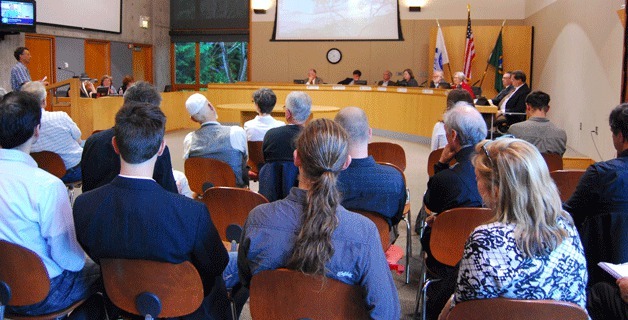Bainbridge marijuana businesses may have to wait until November for city officials to establish permanent, reliable regulations.
Following a public hearing that invited a range of opinions, the Bainbridge Island City Council voted unanimously on more temporary regulations for new marijuana enterprises on the island.
“Our intent is to revisit this ordinance and probably to reorganize it and to continue the discussion,” said Councilman Val Tollefson.
“This is mechanically what we decided to do to be able to have more time to work on this,” he said.
The ordinance will limit marijuana retail to neighborhood service centers Rolling Bay, Island Center and Lynwood Center. Marijuana growing businesses will only be allowed in the business/industrial zone on Day Road.
Marijuana processing will likewise be limited to the business/industrial zone, and collective gardens will be banned citywide.
The new ordinance will sunset Nov. 12, at which time the council said they will reopen the discussion.
Despite the unanimous vote, the council was divided during this week’s meeting on where and how marijuana businesses should be regulated.
A final decision came only after extensive discussion and a closed-door executive session on how the council could legally buy more time.
“There are a lot of sincere people with good opinions,” said Councilman Wayne Roth.
“There aren’t a lot of facts, other than what we know in terms of what the Liquor Control Board has done,” he noted. “I share Councilman Tollefson’s concern that we try to do as well as we can do.”
The council’s vote, for the time being, rejects the most controversial piece of the Bainbridge Island Planning Commission’s recommendation on marijuana regulations.
In a narrow 4-3 vote, the commission recommended the council allow greenhouse, Tier 1 marijuana-growing operations on properties in the R-0.4 zoning district, a residential zone that allows one house per acre.
Tier 1 producers are the smallest allowed under state regulations, and licenses would have allowed growing operations of less than 2,000 square feet of plant canopy.
Under the new ordinance, though, growers will be allowed at indoor facilities at the business/industrial zone on Day Road.
Councilmen Tollefson, Roth and Roger Townsend said they were opposed to moving marijuana growing to the business/industrial zone for several reasons.
“Regulating it, in my opinion, to the industrial zone is saying no, we’re not going to have it,” Roth said.
The cost of meeting the energy regulations and the burden of finding an available site in a limited area, the councilmen agreed, would effectively continue the status quo of no authorized marijuana gardens on Bainbridge.
Townsend explained that by instead allowing marijuana growing in what is already zoned for agricultural use — the island’s R-0.4 zoned areas — the city could continue to encourage marijuana businesses into the mainstream.
Limiting production to the business/industrial area risks a de facto ban for growing on Bainbridge, officials have said.
At one point in an earlier planning commission meeting, the majority of the group favored growing in the business/industrial zone. The commission decided against the idea, however, because the state’s 1,000-foot condition affects most of area and there are less property owners than there are properties.
Marijuana growing in the business/industrial zone would be dependent on property owners who are willing to sell or lease to marijuana business.
Several residents are opposed to marijuana businesses moving into their neighborhoods, while others have expressed support.
“It doesn’t matter how small it is or if it is indoors,” said Susan Wilmot, who lives on Old Mill Road near a proposed site for a marijuana-growing operation.
“If I decide to sell my house, I will most likely have to fill out Form 17 to disclose the fact that I’m near a marijuana farm,” she said.
Others took the opposite side.
“I personally do not believe any of the arguments in opposition to these legal, licensed and controlled environments,” said Chuck Beek. “There is no evidence, just fear-based suppositions. If done right, and I’m convinced it will be, this endeavor will be nothing more than a straight forward farming operation with some commercial benefit.”
Citizens were also concerned about having a marijuana retail store open up in Rolling Bay.
Earlier this month, Evergreen ranked first in the state lottery for business licenses for Bainbridge Island’s single pot shop.
Under a sublease with Bainbridge Island Taxi, the business would be located at 10320 NE Valley Road.
The taxi business currently leases a 1,600 square-foot space from Rolling Bay Jiffy Mart owner, Soon Hong.
During this week’s public hearing, Tim Golon, a Bainbridge resident, read from a letter from Hong.
“As a family, we have personally seen the negative effects of drugs on our family and loved ones,” Hong wrote. “Also we feel that our tenant Bainbridge Island Taxi violated our trust in subletting to the Evergreen company without our permission or any thought to our personal feeling and beliefs.”
Under Liquor Control Board’s rules, marijuana businesses must have the consent of the property owner. Without it, the application is subject to rejection.
Following public comments, the council also directed city staff to submit an inquiry to the Liquor Control Board about the proximity of the Island Music Guild to the proposed marijuana retail site.
Since the guild is a nonprofit and serves children under the age of 21, Evergreen may also be subject to the buffer imposed by the state which prohibits marijuana businesses to be within 1,000 feet of a recreation center or facility.
After breaking into an executive session to discuss the potential of litigation if the council were to continue temporary regulations, the council decided to approve the proposed ordinance with a clear termination date for Nov. 12.



